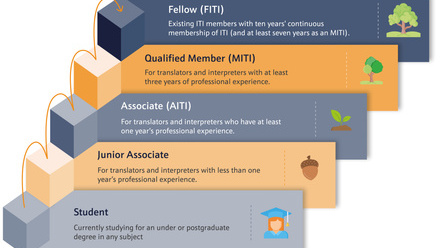Moving up to MITI
Hayley Carter-Smith recently took the MITI translation assessment. She explains the process involved and the satisfaction and pride in passing.
When I signed up as a Student member of ITI in October 2018, the goal was, of course, to undertake the MITI assessment as soon as I possibly could after the cursory three years of initial membership. Not entirely surprisingly, those three years absolutely flew by – in fact, I had no idea they’d even passed at all, until I received an email from the ITI informing me that as an Affiliate with three years of membership, I could now apply for the MITI assessment. I can’t be the only one for whom two years plus of a global pandemic has ruined all concept of time!
I was pleased to have been reminded and was delighted that ITI was offering a discount off the assessment fee for a limited period as a further incentive. But, for a few weeks (possibly even a couple months), I dithered over whether I should do it or not. The assessment fee was on my mind in spite of the discount, plus I have been thinking about applying to start a PhD next year. Was it something I really needed to do? But then, I realised there was something else behind it… in short, I was scared I wouldn’t pass. With my rational-thinking brain engaged, I knew that appearing in the directory could help me find new clients, and remembered that, as long as I maintained my ITI membership, I could be an MITI forever. So, after a considerable amount of naval gazing, I decided to go for it.
The first stage was to complete an application form and ask for two professional references. I felt quite nervous to do this at first, but I needn’t have worried – the clients I asked were both very happy to see this progression in my professional development.
When all that had been received and approved by the ITI office, I needed to choose a first and second choice subject matter from a list provided by ITI. I chose International affairs, NGOs, Politics and Society as my first choice, as these broadly reflect my specialisms, and medical/pharmaceutical as my second. Because of the nature of this form of assessment, there’s not much revision you can do, but it seemed like a good excuse to build up some CPD hours. With my chosen subject interest, I wanted to ensure I was au fait with current francophone news for the couple of weeks before the assessment – even though I had no idea when the source text would be from, it still got me in the right frame of mind. I also watched back Joachim Lepine’s excellent ITI webinar on “smoking hot syntax” from May 2021. It was a good refresher and I ended up jotting down some notes that proved useful during the assessment itself!
When the day arrived to receive the source text, I was very nervous indeed. When the ITI email pinged into my inbox, I took a deep breath, opened the source text, and took a good look at it. Of course, I can’t give anything away about the text itself, but the subject matter worked well for me and, although it was a different text type to those I usually work with, I felt comfortable with it. I began taking notes during my first read-through, related more to the tone and register than on a specific word level.
You have four days to complete the assessment and accompanying commentary, which gave me plenty of time to translate a section or two, then return to it later for an edit after some time away from it. My regimented plan to work on it for four hours everyday went out of the window – as I’m sure we have all experienced, the niggling desire to “tinker” with what you’ve already done is a hard one to fight!
As I got further into the translation of the text itself, there were a fair number of tricky phrases that required a lot of research, and some word play that saw me mulling over phrases in my mind long after I’d switched off my PC for the night. I started to doubt I would pass, but the commentary was a great opportunity to explain some things that would have been open for debate, and helped me explain some of my more subjective choices. With one turn of phrase, I had to ask a couple of French native-speaker friends whether my interpretation was correct, which led to a lively debate between them! I found this reassuring as it meant there were a couple of ways to interpret the phrase in the source language, and I was able to render it the way that worked best for my target text. It is permissible to seek advice from friends or colleagues on individual terms or phrases, but this has to be made clear in the accompanying assessment declaration. The MITI Applicant Handbook explains this in more detail.
Around two weeks after submission, I was relieved and elated to find out I had passed! Like many colleagues I know who have taken the assessment, I barely told anyone until I received my result. After a short period of celebration, I polished my Directory entry and added my new post-nominals to my social media handles, keen to share this new step in my career development with colleagues and friends!






